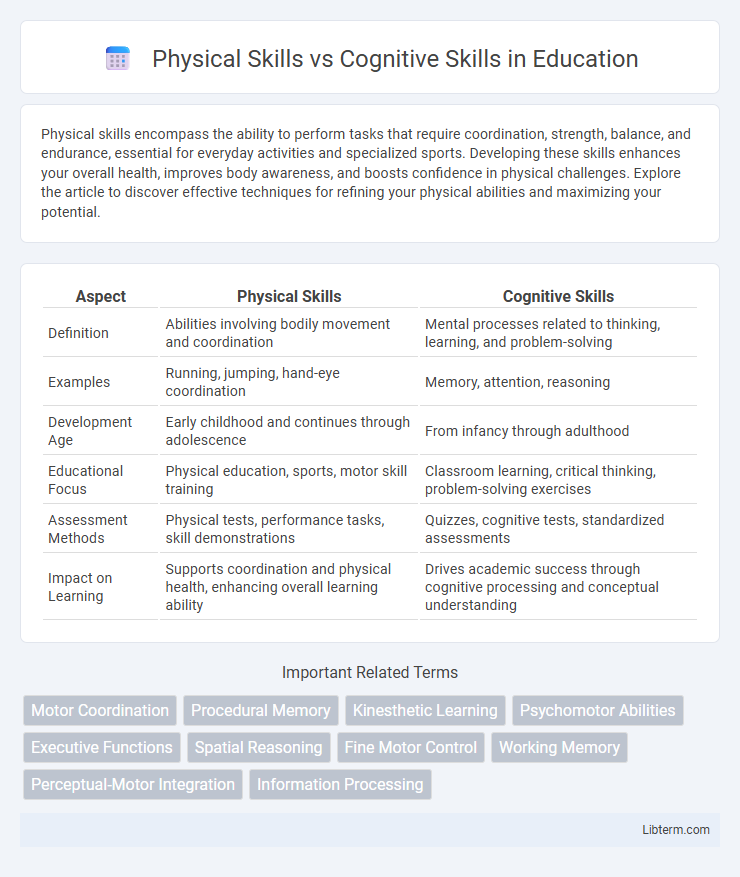Physical skills encompass the ability to perform tasks that require coordination, strength, balance, and endurance, essential for everyday activities and specialized sports. Developing these skills enhances your overall health, improves body awareness, and boosts confidence in physical challenges. Explore the article to discover effective techniques for refining your physical abilities and maximizing your potential.
Table of Comparison
| Aspect | Physical Skills | Cognitive Skills |
|---|---|---|
| Definition | Abilities involving bodily movement and coordination | Mental processes related to thinking, learning, and problem-solving |
| Examples | Running, jumping, hand-eye coordination | Memory, attention, reasoning |
| Development Age | Early childhood and continues through adolescence | From infancy through adulthood |
| Educational Focus | Physical education, sports, motor skill training | Classroom learning, critical thinking, problem-solving exercises |
| Assessment Methods | Physical tests, performance tasks, skill demonstrations | Quizzes, cognitive tests, standardized assessments |
| Impact on Learning | Supports coordination and physical health, enhancing overall learning ability | Drives academic success through cognitive processing and conceptual understanding |
Defining Physical Skills and Cognitive Skills
Physical skills involve the precise control and coordination of muscles for tasks such as running, jumping, or manipulating objects, relying heavily on motor functions and sensory feedback. Cognitive skills encompass mental processes like attention, memory, problem-solving, and decision-making, enabling complex understanding and knowledge application. Defining these skill sets highlights the distinction between bodily movement proficiency and intellectual capabilities essential for various human activities.
Key Differences Between Physical and Cognitive Skills
Physical skills involve bodily movements and coordination, such as strength, agility, and motor control, essential for tasks like sports and manual labor. Cognitive skills relate to mental processes including memory, problem-solving, and attention, critical for learning, decision-making, and planning. The key difference lies in physical skills relying on neuromuscular functions, whereas cognitive skills depend on brain activities and intellectual capabilities.
Importance of Physical Skills in Daily Life
Physical skills, including coordination, balance, and motor control, are essential for performing everyday tasks such as walking, lifting, and manipulating objects. These abilities enhance independence, prevent injuries, and contribute to overall health by promoting an active lifestyle. Developing physical skills supports not only bodily function but also boosts mental well-being through increased energy and reduced stress levels.
The Role of Cognitive Skills in Problem-Solving
Cognitive skills such as critical thinking, memory, and attention play a crucial role in effective problem-solving by enabling individuals to analyze situations, generate solutions, and make informed decisions. These mental processes facilitate the understanding of complex problems and the application of logical reasoning to identify optimal outcomes. Enhancing cognitive abilities improves adaptability and efficiency in tackling diverse challenges across academic, professional, and everyday contexts.
How Physical Skills Complement Cognitive Abilities
Physical skills enhance cognitive abilities by improving neural efficiency and brain function through activities such as aerobic exercise and coordination training. Engaging in regular physical movement increases blood flow to the brain, supporting memory, attention, and problem-solving capabilities. This synergy between physical and cognitive domains fosters better overall mental performance and adaptability in complex tasks.
Impact of Training on Physical and Cognitive Skills
Training significantly enhances both physical and cognitive skills by promoting neuroplasticity and muscle adaptation. Physical training improves coordination, strength, and endurance, while cognitive training boosts memory, attention, and problem-solving abilities. Consistent practice in targeted exercises results in measurable improvements in skill performance and overall brain-body efficiency.
The Interdependence of Body and Mind
Physical skills such as coordination, strength, and agility directly influence cognitive functions like focus, memory, and problem-solving, demonstrating the interdependence of body and mind. Neurological studies reveal how motor activities stimulate brain regions responsible for executive functions, enhancing overall mental performance. This symbiotic relationship underscores the importance of integrating physical exercise with cognitive training for optimal brain health and functional ability.
Enhancing Performance: Physical vs. Cognitive Approaches
Enhancing performance involves targeted development of both physical and cognitive skills, with physical approaches emphasizing strength, endurance, and coordination through structured training, while cognitive methods focus on improving memory, attention, and problem-solving via mental exercises and strategic practice. Integrating biomechanical analysis with neurocognitive techniques enables optimal performance gains by addressing both motor function and mental agility. Research from institutions like the American College of Sports Medicine highlights that balanced enhancement of physical and cognitive skills leads to superior outcomes in athletic and professional environments.
Assessment Methods for Skill Development
Assessment methods for physical skills often involve performance tests measuring strength, coordination, balance, and endurance, using tools like motion sensors, force plates, and timed drills to quantify improvement. Cognitive skills assessments utilize standardized tests, computer-based simulations, and problem-solving tasks evaluating memory, attention, reasoning, and decision-making abilities. Combining objective measurements from both domains provides a comprehensive evaluation framework essential for targeted skill development programs in education and professional training.
Future Trends in Physical and Cognitive Skill Education
Emerging technologies like virtual reality and AI-driven platforms are transforming physical and cognitive skill education by providing personalized, immersive learning experiences that adapt to individual needs. Future trends emphasize the integration of neurofeedback and motion capture systems to enhance skill acquisition and performance monitoring in both domains. Increased interdisciplinary research supports a holistic approach, blending physical dexterity with advanced problem-solving and critical thinking abilities to meet evolving workforce demands.
Physical Skills Infographic

 libterm.com
libterm.com